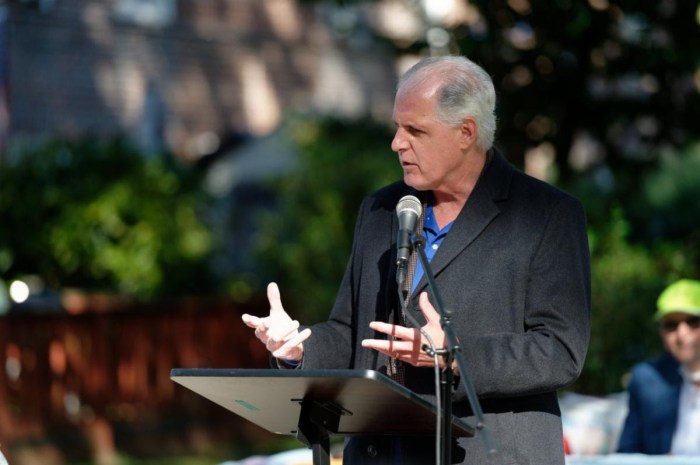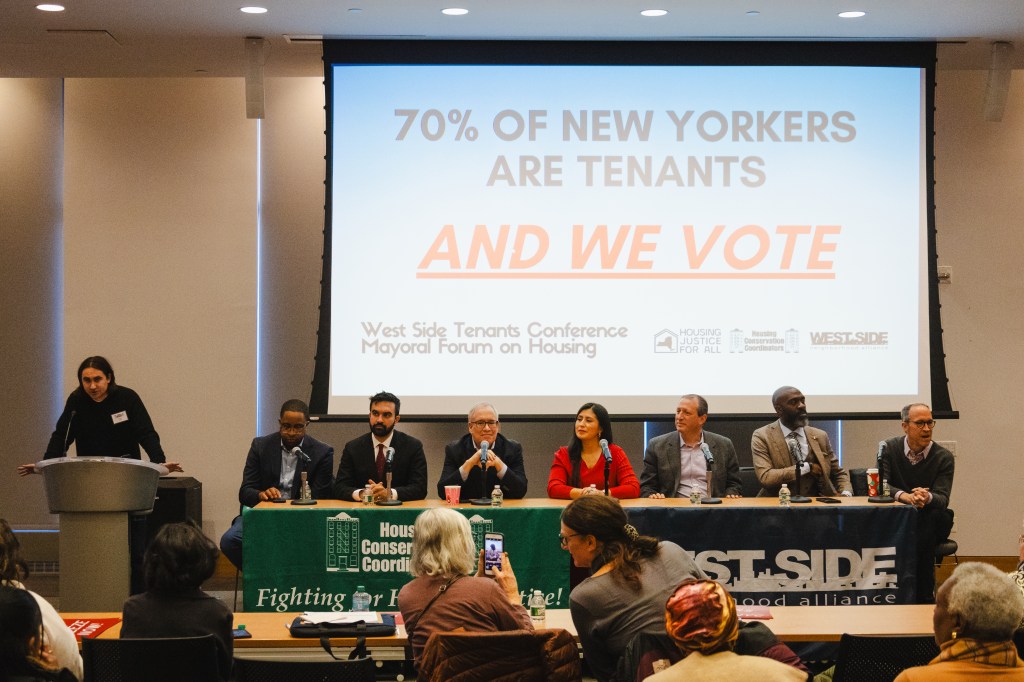By Patricia Demchak
U.S. Sen. Charles Schumer and City Councilman Hiram Monserrate (D-Corona) Monday called on the U.S. government to grant Temporary Protected Status to all Colombian citizens living in the United States, citing recent escalations of the violence and political turmoil that have rocked Colombia for years.
In a news conference at the Colombian Civic Center in Corona, Schumer said giving Colombians the TPS immigration status is the “humanitarian” solution to a situation where thousands of Colombians have fled the warlike conditions and economic instability of their homeland.
“It gives them a chance, a chance that given the situation in their homeland, they would not otherwise have,” Schumer said. “What is America about if it’s not about opportunity?”
TPS is a special immigration designation that allows citizens of qualified countries to remain and work in the United States legally for 18 months, regardless of their prior immigration status, according to the Immigration and Naturalization Service.
As many as 20,000 undocumented Colombians in Queens and 200,000 nationwide could benefit if the U.S. State Department and Attorney General John Ashcroft approve TPS for Colombians, Schumer said.
Congress established the designation in 1990 to provide temporary refuge for foreigners whose countries are too ravaged by war, natural disasters or other “extraordinary conditions” to handle their return. Since then 10 nations have been granted TPS, including El Salvador, Honduras, Somalia and Sudan.
Colombia’s foreign minister asked the United States for TPS designation in May 2001, and Schumer said the current crisis in Colombia equals or exceeds conditions in countries that have qualified in the past.
“To expect the thousands of Colombians living in the United States to return to their country during this state of conflict is both unfair and unreasonable,” Schumer said.
Colombia has struggled for decades as conflicts between leftist rebels, the government and conservative paramilitary forces have devastated the economy and created a culture of kidnapping, violence and fear. On Feb. 21 President Andres Pastrana suspended peace agreements with the violent leftist guerrilla group FARC after more than three years of peace talks and continued terrorist attacks by the group.
During January and February alone, rebels killed more than 20 civilians, hijacked a Colombian airliner carrying 35 passengers and kidnapped both a senator and a presidential candidate, according to the U.S. State Department.
Meanwhile, unemployment in the country hovers around 17 percent and the economy is still recovering from a 1999 recession, the department reported.
These conditions have prompted a widespread exodus from Colombia to countries like Spain, Venezuela and the United States, said Mercedes Cano, a Jackson Heights legal resources director and proponent of TPS for Colombians. Schumer said more than 1.3 million Colombians have fled their country since the mid-1980s.
“For one reason or another, you have to leave,” Juan Mendez, 46, said in Spanish. Mendez left his home in Bogota in 1998 and now lives in Kew Gardens Hills and hopes to qualify for TPS so he can work legally.
Those who receive TPS can obtain a valid Social Security card and work authorization. When the 18-month protection period expires, all TPS recipients return to their original immigration status. The Justice Department, however, may extend protected status if a country remains embroiled in crisis.
Immigrants at the news conference expressed concern that if they apply for TPS, they will alert the INS to their illegal presence in the United States and become targets of crackdowns once their protected status expires.
Such fears have kept potential TPS recipients from applying in the past, but Monserrate said applicants should not be concerned. If TPS is granted to Colombians, he said, his office will “make sure to get the message out” so that all who qualify follow through with applications.
“TPS is literally a lifeline for Colombians,” Monserrate said.
Cano said TPS is the only option for many Colombians seeking refuge. Nearly 7,300 Colombians applied for asylum in 2000, Schumer said in a statement. But while the approval rate for Colombians seeking political asylum has improved from 11 percent in 1993 to 65 percent in 2000, Cano said many Colombians are not allowed to apply for asylum.
The U.S. government provides asylum only to individuals who can prove “credible fear” that they are personal targets of political or other violence, Cano said.
Reach reporter Patricia Demchak by e-mail at Timesledgr@aol.com or call 229-0300, Ext. 155..

































